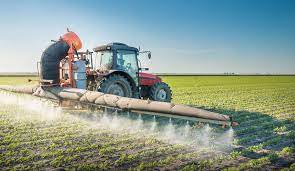What are pesticides? They are any chemical compounds used to control pests in plant or animal agriculture. There are many types of pesticides, depending on their purpose. For example, insecticides are used to control insects while fungicides are effective against fungi. In addition, rodenticides are used to control rodents while molluscicides are used to control slugs and snails. Every year pesticides are spilled and dumped on our land by the millions of tons.
How do pesticides enter our water supply system?
 There are many ways by which pesticides can enter waterways. For example, they include surface runoff, percolation through or erosion of soil, direct fall to the surface when sprayed from aircraft, runoff with wastewater generated by pesticide production or washing of spraying equipment, runoff with municipal wastewater (this applies mainly to fungicides and bactericides), runoff with wastewater from plants that use pesticides such as textile mills. Therefore, pesticides are found in groundwater and surface water, which goes directly to the water treatment plant. Moreover, in some cases, pesticides can get into underground mineral water.
There are many ways by which pesticides can enter waterways. For example, they include surface runoff, percolation through or erosion of soil, direct fall to the surface when sprayed from aircraft, runoff with wastewater generated by pesticide production or washing of spraying equipment, runoff with municipal wastewater (this applies mainly to fungicides and bactericides), runoff with wastewater from plants that use pesticides such as textile mills. Therefore, pesticides are found in groundwater and surface water, which goes directly to the water treatment plant. Moreover, in some cases, pesticides can get into underground mineral water.
Pesticides are very resistant to decomposition
and what is more – they accumulate in human or animal body more easily than in water or soil. They are especially “eager” to accumulate in fat tissue as well as in the liver and brain. Some have strong carcinogenic effects – DDT, dieldrin, chlordane, heptachlor and lindane can be mentioned in this group. Most pesticides have negative effects on the central and peripheral nervous systems. They can also disrupt liver function and immune processes. Additionally, pesticides have been shown to reduce fertility in female animals. Of course, the amounts of pesticides found in drinking water will not lead to immediate poisoning. However, it is important to remember the ability of these chemicals to accumulate in human bodies.
Conclusion
Pesticides can appear in drinking water and accumulate in the human body for years. To eliminate the risk of their occurrence, water should be purified with home filters using the reverse osmosis mechanism. The latter is the only method that fully removes harmful chemicals.

